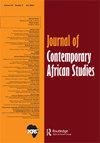Fight or flight? Understanding female students’ response to sexist humour at an institution of higher learning in Zimbabwe
IF 0.8
Q2 AREA STUDIES
引用次数: 0
Abstract
ABSTRACT Student protests of 2015–2016 in South African higher education institutions calling for the decolonisation of higher education spaces and equal access to these spaces have necessitated and led to increased scrutiny around the lived experiences, particularly of female students in university spaces. Critical attention has been paid to how hegemonic structures of power embedded in higher education spaces continue to exclude and marginalise female students through gendered, sexualised and other forms of social identity and difference which are often taken for granted. As such, the study explores how female students at a university in Zimbabwe process, react and respond to this collective expression of male hegemony through sexist humour. The study further explores how these enactments may be constrained and therefore serve to re/produce, legitimise and instil gendered norms of violence. Findings from this study reveal how women respond to, resist and affirm their position in higher education.打架还是逃跑?了解津巴布韦一所高等学校女学生对性别歧视幽默的反应
2015-2016年南非高等教育机构的学生抗议活动呼吁高等教育空间的非殖民化和平等进入这些空间的机会,这需要并导致对生活经历的更多审查,特别是大学空间中的女学生。高等教育空间中的霸权权力结构如何通过性别、性别化和其他形式的社会身份和差异继续排斥和边缘化女学生,这通常被认为是理所当然的。因此,本研究探讨了津巴布韦一所大学的女学生如何通过性别歧视幽默来处理、反应和回应这种男性霸权的集体表达。该研究进一步探讨了这些法规如何受到限制,从而有助于重新/产生、合法化和灌输性别暴力规范。这项研究的结果揭示了女性如何回应、抵制和肯定她们在高等教育中的地位。
本文章由计算机程序翻译,如有差异,请以英文原文为准。
求助全文
约1分钟内获得全文
求助全文
来源期刊

Journal of Contemporary African Studies
AREA STUDIES-
CiteScore
2.20
自引率
0.00%
发文量
18
期刊介绍:
Journal of Contemporary African Studies (JCAS) is an interdisciplinary journal seeking to promote an African-centred scholarly understanding of societies on the continent and their location within the global political economy. Its scope extends across a wide range of social science and humanities disciplines with topics covered including, but not limited to, culture, development, education, environmental questions, gender, government, labour, land, leadership, political economy politics, social movements, sociology of knowledge and welfare. JCAS welcomes contributions reviewing general trends in the academic literature with a specific focus on debates and developments in Africa as part of a broader aim of contributing towards the development of viable communities of African scholarship. The journal publishes original research articles, book reviews, notes from the field, debates, research reports and occasional review essays. It also publishes special issues and welcomes proposals for new topics. JCAS is published four times a year, in January, April, July and October.
 求助内容:
求助内容: 应助结果提醒方式:
应助结果提醒方式:


